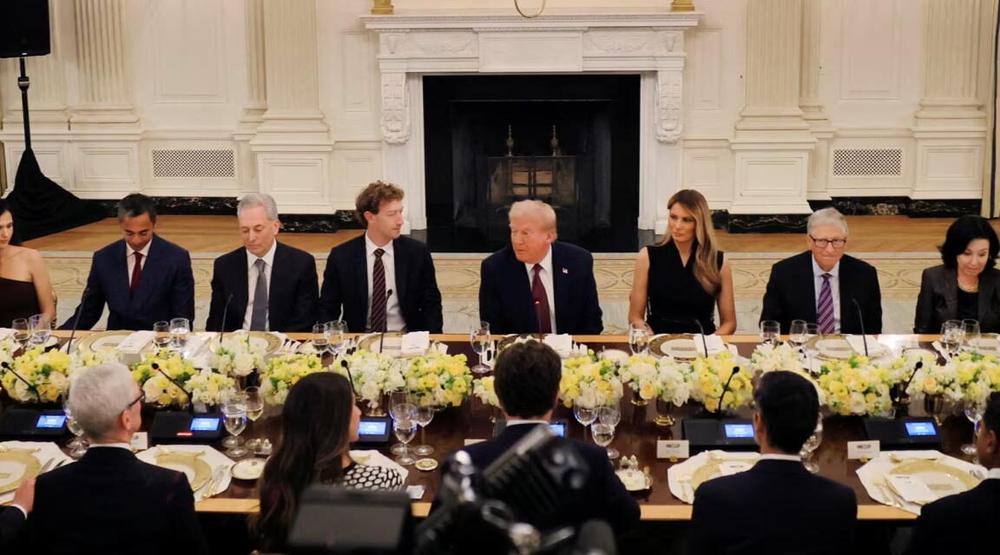Flanked by Silicon Valley’s most powerful executives in the White House last week, Melania Trump hailed artificial intelligence as potentially “the greatest engine of progress in the history of the United States of America.”
Less than a mile from the first lady, in a hotel ballroom packed with MAGA faithful, top Republican Josh Hawley had a different message.
AI “threatens the common man’s liberty” and could even undermine the Republic itself, the senior US senator from Missouri said.
“The problem with the AI revolution as it’s currently going is that it only entrenches the power of the people who are already the most powerful people in the world,” he said. “The goal is to replace... the farmer, the assembly line man, the construction worker.”
Hawley is a frequent critic of Big Tech. But his comments are endorsed by a growing chorus on America’s right—even as President Donald Trump’s administration scraps regulatory barriers and accelerates AI’s adoption across the land.
It presages an unexpected clash at the heart of the MAGA world.
Evangelical pastors, political strategists, and academics gathered at the recent National Conservatism Conference—the MAGA movement’s ideological nerve center—were full of contempt for the technology.
“There’s a lot of people who are basically worried about... what actually is going to happen to unemployment and families and the culture and education with advanced AI, even if it doesn’t make it to artificial superintelligence,” said Geoffrey Miller, an evolutionary psychologist who spoke on a panel at the conference.
The “AI industry shares virtually no ideological overlaps with national conservatism,” he said.
Attendees came from groups that helped shape the Trump administration’s policy platform but were “overwhelmingly positive” about the speech, Miller said. “There’s a lot of people [who were] just like, what do I read to learn more?”
Some on the MAGA right have long been skeptical of Big Tech’s conversion to Trump.
Former White House chief strategist Steve Bannon has called for Mark Zuckerberg—who sat next to Trump at a recent White House dinner with other AI leaders—to be jailed for using his Facebook platform to help Democrats.
But AI’s rise has given the skeptics another cudgel with which to beat Silicon Valley elites.
A warning by Anthropic chief executive Dario Amodei that AI could wipe out half of all entry-level, white-collar jobs within five years was seized upon by some on the right, who called for Trump to constrain the technology.
Christian conservatives fear that the kind of companionship offered by AI bots will damage society or even dissuade people from marrying. They also worry about AI pornography and the use of the technology to “undress” humans.
The conservative pushback intensified after reports of people committing murder and teenagers dying by suicide after prolonged interactions with chatbots including OpenAI’s ChatGPT.
The company is being sued by the family of Adam Raine, a 16-year-old who killed himself in April after seeking mental health support from the product. Raine’s family claim the chatbot even provided tips on the best materials for a noose. (Following the filing, OpenAI announced new safety protocols for teens on ChatGPT.)
Conservative media figures, including Megyn Kelly, decried the incident as “horrific.” Mike Davis, a Trump ally who helped push his Supreme Court nominees through the US Senate, urged people to “watch and remember” a TV interview with Raine’s parents, “when the AI oligarchs go begging Congress again” for legal relief.
An initial sign of the AI backlash on the right came this summer when Bannon and Davies convinced Republicans to scrap part of Trump’s “big, beautiful, bill” that would have stopped states regulating AI themselves.
The AI industry had lobbied hard for the moratorium, saying it would give the sector legal clarity.
Polling showed that the skeptics on the right better understood the country’s mood. A YouGov survey found that more than 55 percent of voters objected to the provision, rising to 70 percent of 18- to 34-year-olds.
“Even the bill sponsor Senator Ted Cruz... voted against his own moratorium, because it was quite clear that the winds had shifted so forcefully in another direction, there was no resisting it,” said Michael Toscano, the director of the Family First Technology Initiative at the Institute of Family Studies. He has described AI as a “malicious technology.”
The defeat of the moratorium was “a major moment in American technology policy,” said Adam Thierer, a senior fellow at the R Street Institute, which pushes for free-market policies.
Despite the Trump administration’s embrace of Big Tech—with boosters such as Silicon Valley investor David Sacks directing AI policy for the president—animus on the right was building, said Thierer.
Some Republicans are still angry over the deplatforming of Trump by tech executives once known for their progressive politics. They had been joined by a “vocal and growing group of conservatives who are fundamentally suspicious of the benefits of technological innovation,” Thierer said.
With MAGA skeptics on one side and Big Tech allies of the president on the other, a “battle for the soul of the conservative movement” is under way.
Popular resentment is now a threat to Trump’s Republican Party, warn some of its biggest supporters—especially if AI begins displacing jobs as many of its exponents suggest.
“You can displace farm workers—what are they going to do about it? You can displace factory workers—they will just kill themselves with drugs and fast food,” Tucker Carlson, one of the MAGA movement's most prominent media figures, told a tech conference on Monday.
“If you do that to lawyers and non-profit sector employees, you will get a revolution.”
It made Trump’s embrace of Silicon Valley bosses a “significant risk” for his administration ahead of next year’s midterm elections, a leading Republican strategist said.
“It’s a real double-edged sword—the administration is forced to embrace [AI] because if the US is not the leader in AI, China will be,” the strategist said, echoing the kind of argument made by Sacks and fellow Trump adviser Michael Kratsios for their AI policy platform.
“But you could see unemployment spiking over the next year,” the strategist said.
Other MAGA supporters are urging Trump to tone down at least his public cheerleading for an AI sector so many of them consider a threat.
“The pressure that is being placed on conservatives to fall in line... is a recipe for discontent,” said Toscano.
By courting AI bosses, the Republican Party, which claims to represent the pro-family movement, religious communities, and American workers, appeared to be embracing those who are antithetical to all of those groups, he warned.
“The current view of things suggests that the most important members of the party are those that are from Silicon Valley,” Toscano said.
Additional reporting by Cristina Criddle in San Francisco.
© 2025 The Financial Times Ltd. All rights reserved. Not to be redistributed, copied, or modified in any way.

 Space Cadet su Windows 95: arrivava a 5.000 FPS con un bug
Space Cadet su Windows 95: arrivava a 5.000 FPS con un bug